

How to make money online. Seth Godin. SETH GODIN: If You're An Average Worker, You're Going Straight To The Bottom. Sold or bought? The first thing you do when you sit down at the computer. Wasting the digital dividend. The internet means that many time-consuming forms of white-collar drudgery have disappeared, or at least been offloaded to cheaper people who aren't you, permitting you to spend more time on things that are actually productive and highly leveraged.
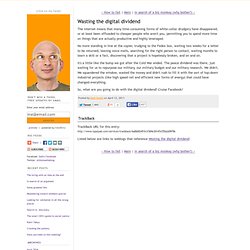
No more standing in line at the copier, trudging to the Fedex box, waiting two weeks for a letter to be returned, leaving voice mails, searching for the right person to contact, waiting months to learn a skill or a fact, discovering that a project is hopelessly broken, and on and on. It's a little like the bump we got after the Cold War ended. The peace dividend was there, just waiting for us to repurpose our military, our military budget and our military research. We didn't. We squandered the window, wasted the money and didn't rush to fill it with the sort of top-down industrial projects (like high speed rail and efficient new forms of energy) that could have changed everything.
Looking for trouble. Every weekend there's a line out front of the Avis rental car window on the upper west side of NYC.
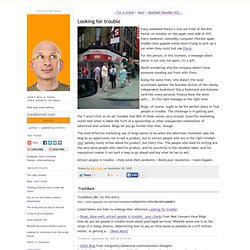
Every weekend, ostensibly computer-literate upper-middle-class yuppies waste hours trying to pick up a car when they could just use Zipcar. For this person, in this moment, a message about zipcar is not only not spam, it's a gift. Worth wondering why the company doesn't have someone standing out front with fliers. Along the same lines, why doesn't the local accountant sponsor the business section of the nearby independent bookstore? Slip a bookmark and business card into every personal finance book the store sells... it's the right message at the right time. Blogs, of course, ought to be the perfect place to find people in trouble. Seven tips to build for meaning. What happens after I click on your Google ad?
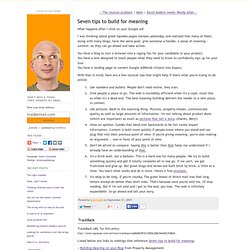
I was thinking about great Squidoo pages (lenses) yesterday, and realized that many of them, along with many blogs, have the same goal: give someone a handle, a sense of meaning--context--so they can go ahead and take action. Starting over with customer service. I've been writing a lot about this topic lately and thinking about it more.
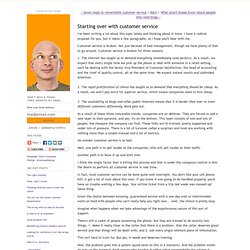
I have a radical proposal for you, but it takes a few paragraphs, so I hope you'll bear with me. Customer service is broken. Not just because of bad management, though we have plenty of that to go around. Make something happen. How to create a great website. Here are principles I think you can’t avoid: 1.
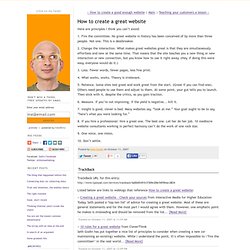
Fire the committee. No great website in history has been conceived of by more than three people. How to get traffic for your blog. The web doesn't care. When I first started talking about Permission Marketing ten years ago, marketers asked, "sure, but how does this help us?
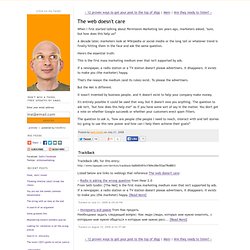
" A decade later, marketers look at Wikipedia or social media or the long tail or whatever trend is finally hitting them in the face and ask the same question. Here's the essential truth: Scarcity. One day, you may be lucky enough to have a scarcity problem.
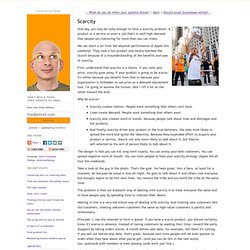
A product or a service or even a job that's in such high demand that people are clamoring for more than you can make. We can learn a lot from the abysmal performance of Apple this weekend. They took a hot product and totally botched the launch because of a misunderstanding of the benefits and uses of scarcity. You should write an ebook. I'm serious.
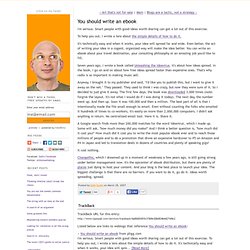
Smart people with good ideas worth sharing can get a lot out of this exercise. To help you out, I wrote a lens about the simple details of how to do it. It's technically easy and when it works, your idea will spread far and wide. Even better, the act of writing your idea in a cogent, organized way will make the idea better. The secret of the web (hint: it's a virtue) Patience.
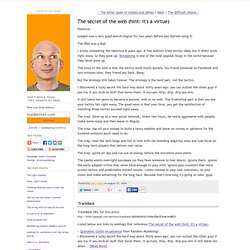
Google was a very good search engine for two years before you started using it. The iPod was a dud. I wrote Unleashing the Ideavirus 8 years ago. Some people are better than others. The reason they want you to fit in... The right size. I've been thinking a lot about issues of scale and units of measure.Many businesses that are in trouble are in trouble for a simple reason: they're the wrong size.
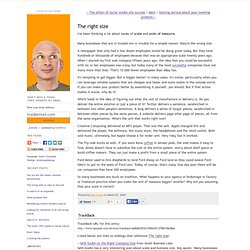
A newspaper that only had a few dozen employees would be doing great today. But they have hundreds or thousands of employees because that was an appropriate scale twenty years ago. When I started my first web company fifteen years ago, the idea that you could be successful with six or ten employees was crazy, but today many of the most successful companies have not many more than that. Imminent. The one thing that will allow your business to get funded, or to get a business to business buyer to buy from you or a college to admit you is the sense that your success is imminent. If it's a foregone conclusion that you're going to break out, that all systems are go, then only an idiot wouldn't jump on board. So, the real question is: what signals indicate that your success is imminent? The brilliant venture capitalists are the guys who invest their money months or years before everyone else realizes how imminent the success is.
They have better radar than the rest of us. The goals you never hear about. Doing goal setting with friends and colleagues is always motivating and invigorating for me. You hear things ranging from, "I want to help this village get out of poverty," or "I want to double our market share," or "I want to be financially independent. " What you rarely hear is, "I don't want to fail," "I don't want to look stupid," or "I don't want to make any mistakes. " The problem is that those goals are really common, and left unsaid, they dominate. What are you good at? As you consider marketing yourself for your next gig, consider the difference between process and content.
Content is domain knowledge. People you know or skills you've developed. Playing the piano or writing copy about furniture sales. A rolodex of movers in a given industry, or your ability to compute stress ratios in your head. Where have all the agents gone? Travel agents... gone.Stock brokers... gone.Real estate brokers... in trouble. Photographer's agents, too.Literary agents? The problem with being a helpful, efficient but largely anonymous middleman is pretty obvious. Someone can come along who is cheaper, faster and more efficient. And that someone might be the customer aided by a computer. The airlines don't want to pay travel agents, because the travel agents were making more money on each flight than they were. First, ten. This, in two words, is the secret of the new marketing. Find ten people. Ten people who trust you/respect you/need you/listen to you... Those ten people need what you have to sell, or want it. And if they love it, you win.
The danger of repeating signals. You don't need more time. Are $300 headphones worth it? Unreasonable. It's unreasonable to get out of bed on a snow day, when school has been cancelled, and turn the downtime into six hours of work on an extra credit physics lab. Pleasing.